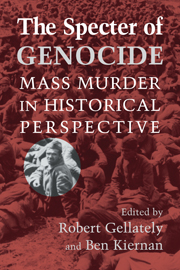Book contents
- Frontmatter
- Contents
- List of Contributors
- Acknowledgments
- INTRODUCTION
- PART I GENOCIDE AND MODERNITY
- PART II INDIGENOUS PEOPLES AND COLONIAL ISSUES
- PART III THE ERA OF THE TWO WORLD WARS
- 9 Under Cover of War
- 10 The Mechanism of a Mass Crime
- 11 The Third Reich, the Holocaust, and Visions of Serial Genocide
- 12 Reflections on Modern Japanese History in the Context of the Concept of Genocide
- PART IV GENOCIDE AND MASS MURDER SINCE 1945
- CONCLUSIONS
- Appendix: Convention on the Prevention and Punishment of the Crime of Genocide
- Index
9 - Under Cover of War
The Armenian Genocide in the Context of Total War
Published online by Cambridge University Press: 05 June 2012
- Frontmatter
- Contents
- List of Contributors
- Acknowledgments
- INTRODUCTION
- PART I GENOCIDE AND MODERNITY
- PART II INDIGENOUS PEOPLES AND COLONIAL ISSUES
- PART III THE ERA OF THE TWO WORLD WARS
- 9 Under Cover of War
- 10 The Mechanism of a Mass Crime
- 11 The Third Reich, the Holocaust, and Visions of Serial Genocide
- 12 Reflections on Modern Japanese History in the Context of the Concept of Genocide
- PART IV GENOCIDE AND MASS MURDER SINCE 1945
- CONCLUSIONS
- Appendix: Convention on the Prevention and Punishment of the Crime of Genocide
- Index
Summary
One of the signal challenges of the historical profession is to provide a guide to understanding the century that has just passed while recognizing that the language historians use is in significant ways inadequate to the task. In that historical narrative, to talk of genocide is unavoidable, but the grammar of historical analysis withers when used to encapsulate the history of genocide.
Some have called this problem a crisis of representation, formulated famously by Adorno in the rhetorical statement that after Auschwitz there can be no poetry. His injunction was to try to write poetry nonetheless. It may be useful to recast Adorno and to say that after Auschwitz there can be no linear history, and yet we must try to write it nonetheless. My claim is that this insight was true long before Auschwitz, and that the need to recognize it and reflect on it was evident well before the Second World War.
Here is the predicament we face. Dietrich Bonhoeffer wrote that only those who cried for the Jews had the right to sing Gregorian chants. I want to suggest that only by confronting the horror of the Armenian genocide of 1915 can we begin to locate the Holocaust of the Second World War within the history of the twentieth century. For both crimes occurred under the cover of world wars; and both disclosed the devastating logic and power of a new kind of war, “total war.”
- Type
- Chapter
- Information
- The Specter of GenocideMass Murder in Historical Perspective, pp. 189 - 214Publisher: Cambridge University PressPrint publication year: 2003
- 5
- Cited by

